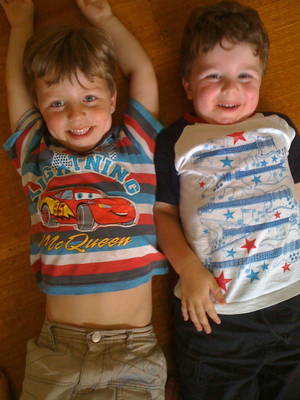How does humour develop?
Interview with
A five year olds favourite joke and how does humour develop in babies?
And closing this month's show, how funny is this?...
Sam - I'm Sam and I'm 5 years old. What did the path say to the wall?
Hannah - I don't know. What did the path say to the wall?
Sam - I like your style.
[laughter]
Hannah - Funny, funny. Now, we've all had our favourites, usually terrible  jokes as children, but how does humour develop? How does laughter develop in the younger child? We turn to Dr. Caspar Addyman from Birkbeck University London to find out what keeps him fired up about his research.
jokes as children, but how does humour develop? How does laughter develop in the younger child? We turn to Dr. Caspar Addyman from Birkbeck University London to find out what keeps him fired up about his research.
Caspar - So, I've been a developmental psychology and studying babies for a long time and most of the time when we're doing that, we're actually making a baby bored. We show them the same thing over and over again, and then we show them something slightly different and see if they stop being bored. That's great for doing a controlled scientific study of how babies learn, but it doesn't capture the most fun thing about babies which is that, they laugh more than we do and at everything.
I was interested in seeing if this would give us a different perspective on what babies learn. So obviously, you and I laugh when we find something funny. Also, when you get the joke and that means the ability to spot that there's something slightly unusual about this joke or this situation.
And so, I wanted to see does that also apply to babies. Does what they laugh at map on to what they understand with different ages. So, we did this big internet survey. We've had 500 parents tell us about their babies so far and so far, we find two big main findings.
Firstly, that laughter does sort of follow this clear development that little moments of things that babies understand. So, dog going meow is not very funny until you understand that dogs are supposed to go woof! So, very young babies don't get that. In fact, the best way to make a 3 to 6-month old baby laugh is to just dangle them upside down because some reason that seems to be their - they may find most hilarious.
The other big thing we found and which is found in adult laughter research is that laughter isn't just about humour and jokes. It's a very social process. The bonding between mother and child is like an essential part of that very early development, the fact that babies have this amazing charisma and ability to make us laugh sort of sticks out a little bit about how laughter and humour works in adults.
If you look at a good entertaining person, there are jokes there, but it's also just that we find them a really charming and charismatic person and that we want to share in the delight that they're showing with us.
That's certainly something that we see between the mother and the baby. A baby, it starts laughing at something but then that sets everybody else laughing, and it's a very much a back and forth process and a social process.
Hannah - Thanks to Dr. Caspar Addyman from Birkbeck London.










Comments
Add a comment